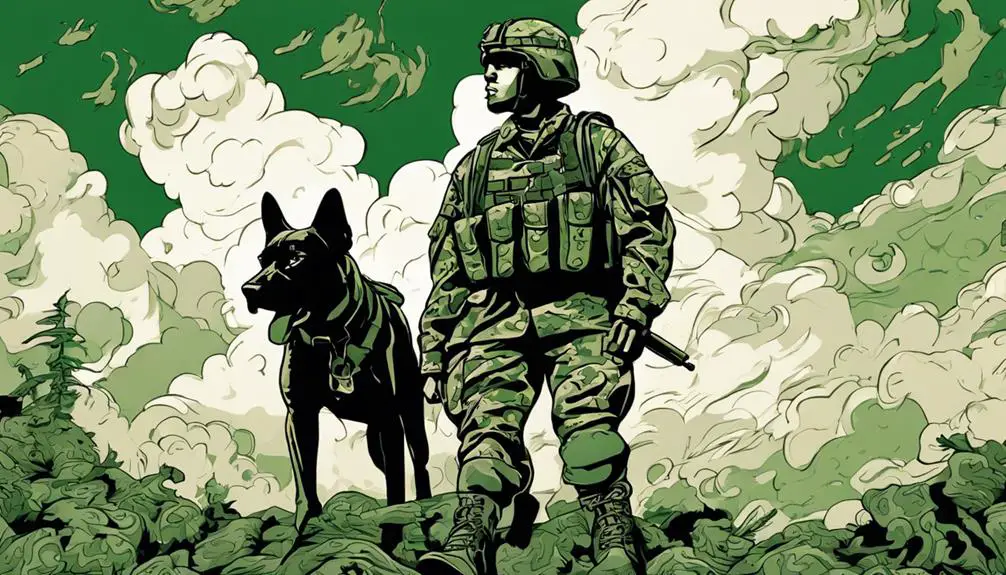You're about to enter the world of military slang, where precision and clarity are essential. Mastering essential phrases like 'Roger that' and 'Oscar Mike' can mean the difference between success and failure in high-stress situations. You'll learn acronyms like ASAP and SITREP, as well as slang for ranks and roles, such as 'Grunt' and 'Devil Doc.' Humorous expressions like 'Embrace the suck' and 'Funny FOB' show how humor helps cope with stress. As you explore further, you'll uncover tactical terms like SITREP and ROE, and discover how each branch has its unique colloquialisms that shape its culture – and that's just the beginning.
Essential Battlefield Lingo
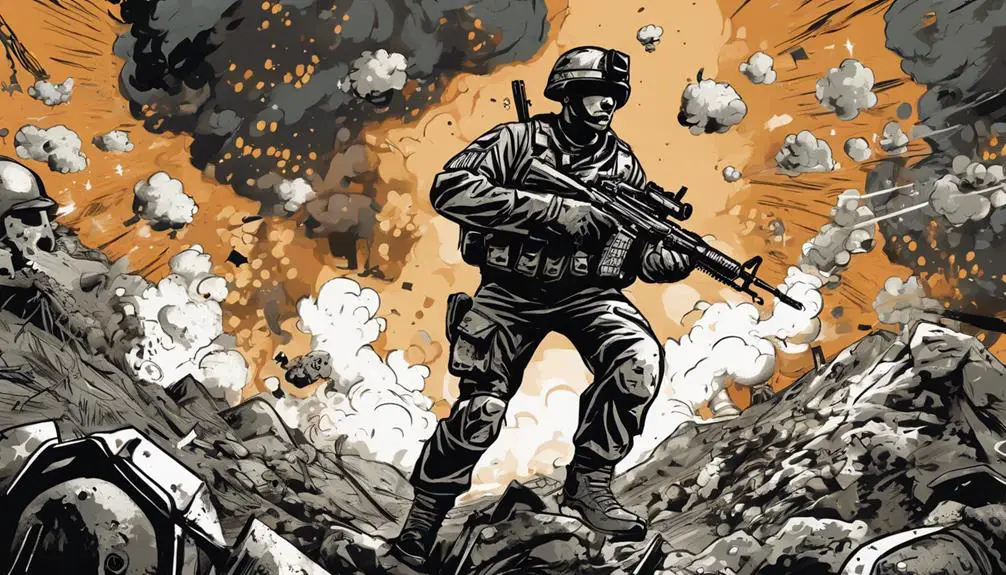
In the heat of battle, you'll need to communicate quickly and effectively, which is why understanding essential battlefield lingo is important for survival. Effective Combat Communications rely on concise and clear language to convey critical information in high-pressure situations. This is where Radio Etiquette comes in – a set of guidelines that guarantee seamless communication over the radio.
As a soldier, you'll need to familiarize yourself with key terms and phrases that facilitate swift and accurate communication. This includes using standardized call signs, clear and concise language, and adhering to established communication protocols. For instance, you'll need to know how to report enemy positions, request backup, and convey mission updates. Understanding these essential terms will enable you to respond quickly and decisively, giving you an edge in combat situations.
Mastering essential battlefield lingo is important for success in combat. By following established communication protocols and using standardized language, you'll be able to convey critical information quickly and accurately, ensuring a strategic advantage on the battlefield.
Phrases for New Recruits
As you step into your new role, you'll need to learn key phrases that'll help you navigate the military landscape, from basic training to deployment. Mastering these essential phrases will help you fit in and avoid 'Freshman Fumbles' that can earn you unwanted attention from your drill instructors.
Here are some vital phrases to get you started:
- Roger that: This phrase indicates you understand and will comply with an order or instruction.
- Hooah: A term used to express enthusiasm, agreement, or motivation. It can also be used to acknowledge an order or instruction.
- SITREP: Short for 'situation report,' this term is used to request an update on the current situation or status.
- Oscar Mike: This phrase means 'on the move' or 'let's go,' often used to signal the start of a mission or exercise.
Embracing the 'Boot Camp Mentality' means being receptive to new information and willing to learn. By incorporating these phrases into your vocabulary, you'll be well on your way to becoming a seasoned military professional.
Acronyms You Need to Know
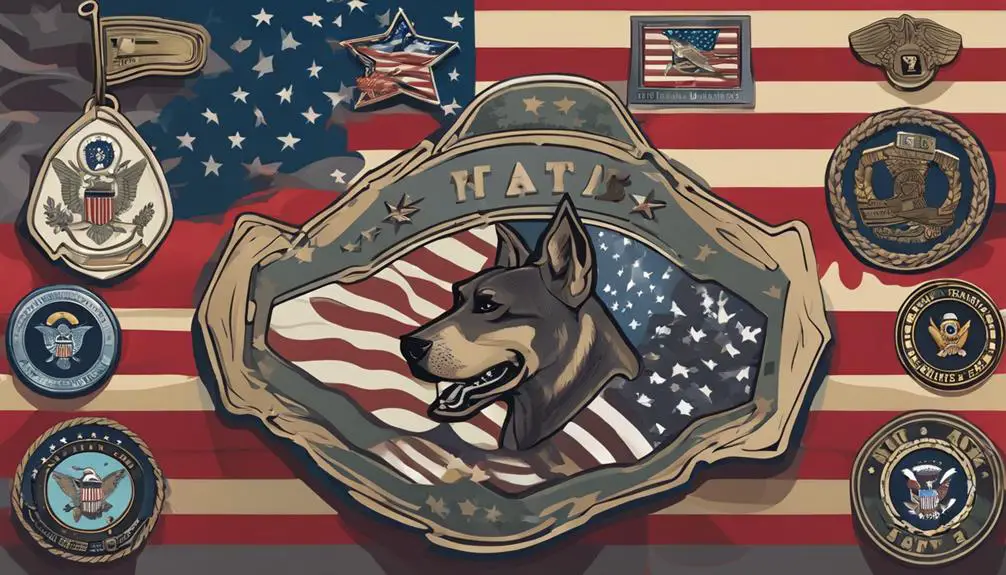
Master a slew of essential acronyms to decode military communications and stay ahead of the curve. You'll encounter a plethora of abbreviations in military speak, and understanding them is important to effective communication. Let's explore the world of acronym origins and declassified abbrevs.
Familiarize yourself with common acronyms like ASAP (As Soon As Possible), SITREP (Situation Report), and EOD (Explosive Ordnance Disposal). These abbreviations are used frequently in military communications, and knowing what they stand for will help you stay informed and on the same page as your comrades.
Acronyms also serve as a shortcut for complex phrases, making communication more efficient. For instance, COMMS (Communications) and Intel (Intelligence) are commonly used to convey critical information quickly.
Slang for Ranks and Roles
You'll frequently encounter colloquialisms that refer to military ranks and roles, such as 'grunt' for an infantryman or 'devil doc' for a Navy corpsman, which can greatly simplify communication. These slang terms, also known as Rank Nicknames or Officer Monikers, are an integral part of military culture. Understanding them can help you better navigate the military world.
Here are some common examples:
- Grunt: Infantryman
- Devil Doc: Navy Corpsman
- Mustang: Officer who rose from the enlisted ranks
- Top: First Sergeant or Master Sergeant
Using these slang terms can help you quickly identify someone's role or rank, and can even be a way to show respect or camaraderie. By familiarizing yourself with these colloquialisms, you'll be better equipped to communicate effectively and efficiently in a military setting.
Humorous Military Expressions
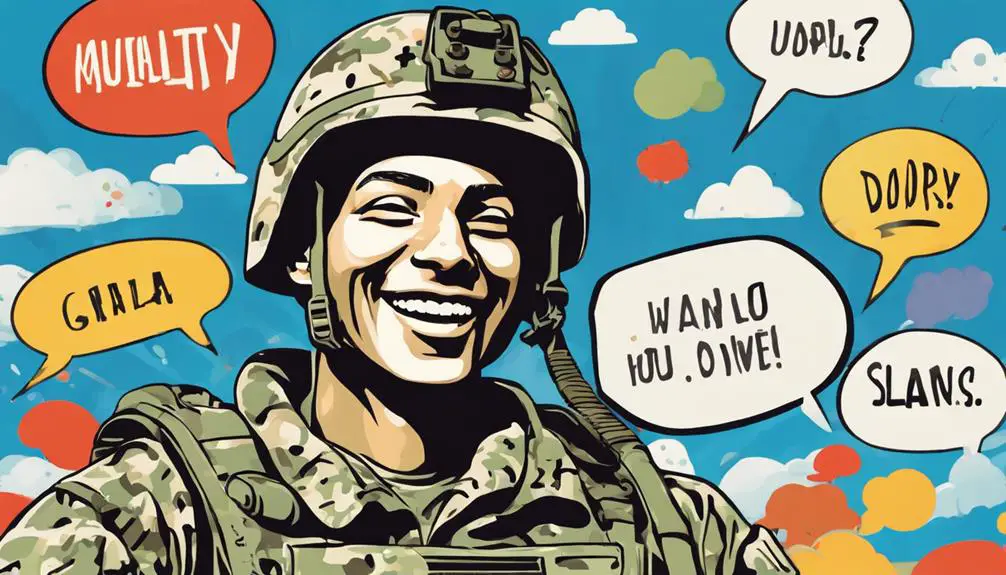
Immerse yourself in the world of humorous military expressions, where phrases like 'Embrace the suck' and 'Hurry up and wait' offer a glimpse into the military's quirky sense of humor. You'll find that military personnel often use humor to cope with the stresses of their job.
'Military Mischief' is a term that sums up the lighthearted, playful vibe that prevails in the military. You might hear a buddy say, 'I'm just trying to find my FOB' – meaning, they're trying to find their Forward Operating Base, but also implying they're trying to find their way in life.
In the military, humor is a way to diffuse tension and bond with comrades. 'Funny FOB' is a term that captures the essence of this camaraderie. You'll often hear phrases like 'What's the haps, man?' (what's happening?) or 'Get some' (get some rest).
These expressions are more than just words – they're a way to connect with fellow service members and find humor in the chaos. So, the next time you're chatting with a veteran, throw around some of these phrases and watch them light up with a smile.
Tactical and Mission Terms
As you shift from the lighthearted world of humorous expressions to the more serious domain of tactical operations, you're likely to encounter a distinct set of terms that are essential to mission success. In this domain, precision and clarity are paramount, and understanding these terms can mean the difference between success and failure.
Here are some essential tactical and mission terms you should know:
- SITREP: Situation Report, providing critical updates on the mission's progress.
- Tactical Insertion: The process of deploying personnel or equipment into a hostile or denied territory.
- Mission Planning: The process of outlining and preparing for a specific operation, including objective definition, resource allocation, and contingency planning.
- ROE: Rules of Engagement, outlining the circumstances under which force can be used.
Mastering these terms is crucial for effective communication and seamless execution of tactical operations. By familiarizing yourself with these critical terms, you'll be better equipped to navigate the complex world of military operations and contribute to mission success.
Historically Significant Slang
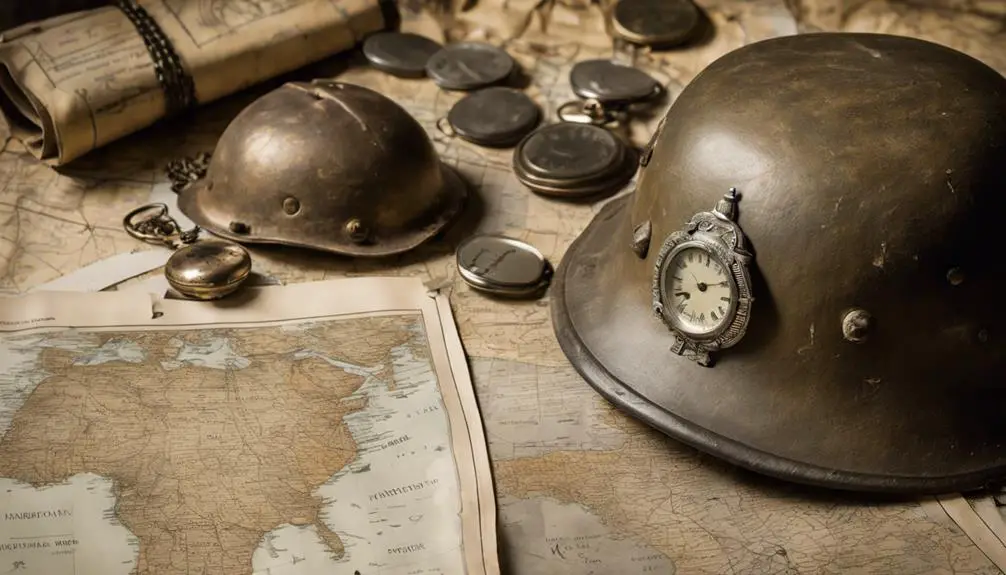
Delving into the world of historically significant slang, you'll uncover a treasure trove of terms that have been etched into military culture, often reflecting the era's unique circumstances and attitudes. These terms offer a fascinating glimpse into the past, revealing the values, fears, and motivations of soldiers throughout history.
As you commence on a journey of slang archaeology, you'll discover how war cries have evolved over time. From the 'Hooah!' of World War I to the 'Oorah!' of modern-day Marines, these battle cries have been a staple of military culture, serving as a rallying cry for troops heading into combat.
You'll also uncover how slang terms like 'doughboy' (World War I) and 'grunt' (Vietnam War) emerged, reflecting the era's cultural and social context.
Colloquialisms Across Branches
Across the Army, Navy, Air Force, and Marines, you'll find a unique dialect of colloquialisms that have evolved within each branch's distinct culture, often reflecting their specialized roles and environments. These colloquialisms have shaped the branch identities and reinforced service stereotypes. While they may seem like inside jokes, they actually serve as a way to build camaraderie and reinforce a sense of belonging within each branch.
Here are a few examples of colloquialisms that are unique to each branch:
- Army: 'Hooah' (an expression of excitement or agreement) and 'SITREP' (situation report).
- Navy: 'Scuttlebutt' (gossip or rumor) and 'Swabbie' (a sailor).
- Air Force: 'Bingo Fuel' (minimum fuel required to return to base) and 'Squawk' (a warning signal).
- Marines: 'Oorah' (a battle cry) and 'High-Speed, Low-Drag' (a phrase used to describe something that's exceptionally good).
These colloquialisms not only add flavor to military language but also reflect the distinct personalities and values of each branch. By embracing these unique dialects, service members can connect with their branch's heritage and reinforce their sense of identity.
Frequently Asked Questions
Can I Use Military Slang in Civilian Life Without Sounding Weird?
You're wondering if you can use military slang in civilian life without sounding weird.
Here's the deal: it's all about Cultural Integration.
When you use military slang in everyday conversations, it can be a hit or miss.
Social Perception plays a huge role – if you're around fellow vets or familiar faces, it's a great way to connect.
But with civilians, it might raise some eyebrows.
Use it sparingly, and be mindful of your audience to avoid confusion.
Are Military Slang Terms Universal Across All Countries' Armed Forces?
You're wondering if military slang terms are universal across all countries' armed forces.
The answer is, it's complicated. While some slang may transcend borders, others are uniquely rooted in a nation's culture and language.
Cross-cultural comparisons reveal that international dialectics play a significant role in shaping military slang.
You'll find that certain terms are adopted globally, while others remain exclusive to a particular country or region.
Do Military Slang Terms Change Over Time or Remain Constant?
As you explore the world of military slang, you'll find that terms don't remain constant over time. In fact, they change markedly due to various factors. Historical context plays an important role, with slang evolving in response to shifting cultural, social, and technological landscapes.
Additionally, factors like globalization, urbanization, and generational differences contribute to the dynamic nature of military slang. You'll notice that terms emerge, adapt, and fade, reflecting the ever-changing nature of the military environment.
Can Enlisted Personnel Create Their Own Military Slang Terms?
You're wondering if enlisted personnel can create their own military slang terms?
The answer is a resounding 'yes!' Like a snowball rolling down a hill, slang evolves rapidly, and those on the ground floor – the enlisted personnel – are often the driving force behind this evolution.
While the rank hierarchy mightn't always officially sanction new terms, they often trickle up from the trenches, reflecting the creativity and camaraderie within units.
Are There Any Military Slang Terms Deemed Offensive or Inappropriate?
Exploring the world of military slang reveals that some terms are deemed offensive or inappropriate. These inappropriate dialects often stem from cultural sensitivities. Certain words or phrases can be hurtful or disrespectful to specific groups. Being mindful of these cultural nuances is crucial to avoid using language that might offend.
Conclusion
You've just stumbled upon a treasure trove of military slang terms that'll have you sounding like a seasoned veteran in no time. From essential battlefield lingo to humorous expressions, you've now got the inside scoop on the language of the military.
Coincidence or not, you're about to become the go-to expert on military slang among your friends. So, the next time you're chatting with a service member, you'll be able to sling the slang like a pro and earn some serious respect.

